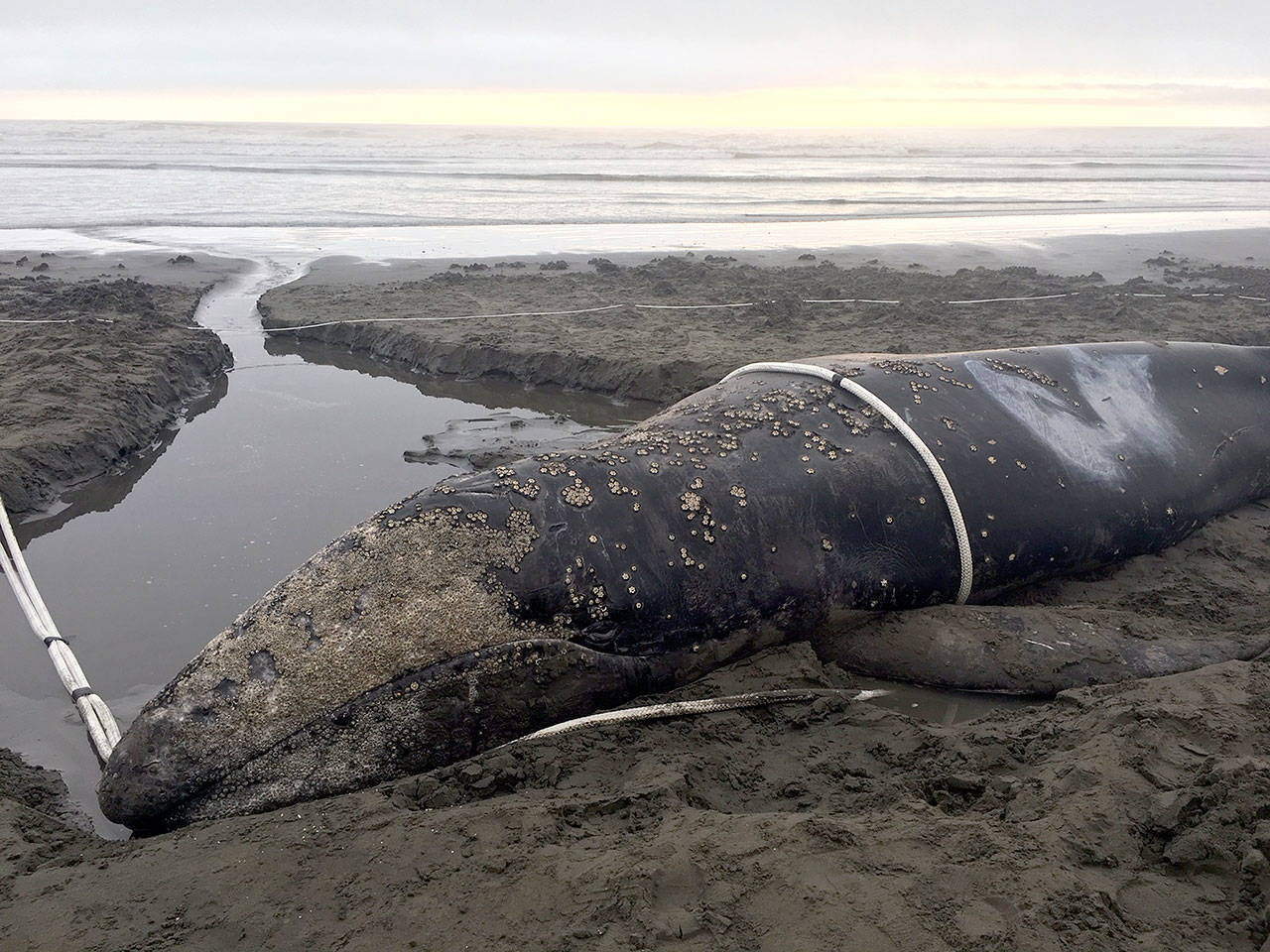KALALOCH — In a rare three-day beaching, experts say size saved the whale.
A 1½-year-old gray whale stranded for three days on a remote beach in the area of Kalaloch in Olympic National Park was freed late Friday night using a pulley system and swam away.
Wildlife veterinarian Lesanna Lahner said the 9,000-pound, 24-foot-long, likely male gray whale survived two days longer than an adult would under similar conditions.
At slighter more than 4 tons, “being smaller allowed him to live longer,” Lahner said.
When a whale becomes stranded on a beach, its immense weight crushes its skeletal muscle and causes its heart to labor to pump, Lahner said. Ordinarily, an adult beached whale will survive a day.
“This is a very rare case,” Lahner said. “Super rare. Everyone around the country is really interested in how the whale was rescued.”
Tensions ran high Friday night. Responders from NOAA Fisheries’ West Coast Marine Mammal Stranding Network, SR3, Cascadia Research Collective, the state Department of Fish and Wildlife and Olympic National Park erected a two-pulley system before high tide at 10:19 p.m.
Michael Milstein, spokesman for National Oceanic and Atmospheric Administration Fisheries, said the rescue effort hinged on the tides that night.
“This was the last real good chance to free the whale,” Milstein said. “And it was in the nick of time.”
At low tide, responders from NOAA Fisheries and Olympic National Park fashioned a harness around the whale linked to pulleys anchored lower on the beach and on the shore.
Prior to the rescue, Lahner and state Department of Fish and Wildlife marine mammal biologist Dyanna Lambourn administered several medications to counteract the whale’s declining condition: anti-inflammatories, B vitamin and sugar — “the equivalent of a candy bar and an ibuprofen,” she said.
She also gave him Valium, a drug used to treat anxiety.
“When wild animals are stranded, it’s like they’ve been abducted by aliens,” Lahner said. “Not only are they on shore, but they’re seeing humans walking around. It’s emotionally scary.”
At high tide, about 25 people used the pulley system to turn the whale seaward and pull him 4 to 6 feet into the surf. Then, a few experienced marine experts entered the water with the whale and removed the harness.
At this point, Lahner thought the operation might fail.
“I’ll be honest — I wasn’t sure it was going to work then,” Lahner said. “We all thought, ‘Oh no. It’s not going to work.’ ”
But then the whale swam away in the “last possible moment,” recalled John Calambokidis of Cascadia Research Collective.
A cheer went up into the night, as the team stood stunned in the misty darkness, Calambokidis said.
“I think everybody was fearing the worst, but the best outcome happened,” Milstein said.
Earlier reports said the whale was female, but when it rolled over Friday, Lahner said it appeared to be male.
Now, park officials and others at Kalaloch Beach will survey the coast in case the whale becomes stranded again.
Another beaching remains a concern, Lahner said. In another successful “refloating” she recalled, the whale became stranded two more times in the two days after the initial rescue.
People on scene were on high alert Saturday and will continue to monitor the beach through next week, she said.
The whale became stranded Wednesday, likely while foraging in shallow water with his parents. That’s not out of the ordinary for gray whales, but the young whale may not have known his limits, Lahner said.
From Wednesday to Friday, officials with the West Coast Marine Mammal Stranding Network and Olympic National Park wrapped the whale in sheets and poured water over him to keep him comfortable.
A 200-foot perimeter surrounded the whale to keep passers-by at a distance.
NOAA Fisheries asks the public to steer clear of stranded marine mammals and instead report them to the West Coast Marine Mammal Stranding Network hotline at 866-767-6114.
________
Reporter Sarah Sharp can be reached at 360-452-2345, ext. 56650, or at ssharp@peninsuladailynews.com.

